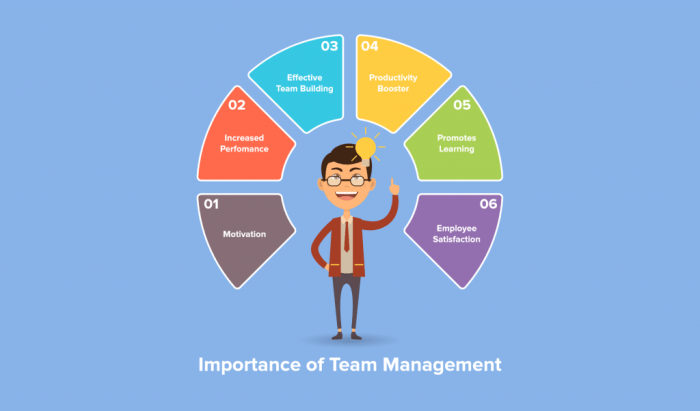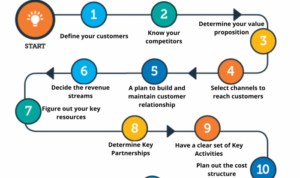Team Management Skills are essential in today’s work environment, impacting productivity and morale. Let’s dive into the key aspects of effective team leadership.
From communication to conflict resolution, delegation, and motivation, these skills play a crucial role in team success.
Importance of Team Management Skills
Team management skills are essential in a work environment as they help in coordinating team members, setting goals, resolving conflicts, and ensuring effective communication within the team.
Improved Productivity and Morale
- Effective team management can lead to improved productivity as team members work together towards a common goal, utilizing each other’s strengths and skills.
- When team members feel supported and valued by their manager, morale is boosted, leading to increased motivation and job satisfaction.
- Clear expectations and roles set by a good team manager can prevent misunderstandings and enhance efficiency in task completion.
Negative Impact of Poor Team Management
- Poor team management can result in confusion, lack of direction, and disorganization among team members, ultimately affecting the quality and timeliness of work.
- When conflicts are not addressed or resolved promptly by the manager, team morale can plummet, leading to resentment, decreased motivation, and high turnover rates.
- Ineffective communication and micromanagement by a team manager can create a toxic work environment, hindering collaboration and creativity among team members.
Essential Team Management Skills

Effective team management requires a diverse set of skills that are essential for leading a group towards a common goal. Let’s delve into the key skills that every team manager should possess.
Communication
Effective communication is crucial for team management as it ensures that everyone is on the same page, understands their roles, and can collaborate efficiently. In a real-world scenario, imagine a project where team members are working remotely. A manager who communicates clearly and regularly via virtual meetings, emails, and messaging platforms can keep the team connected and engaged, resulting in better coordination and productivity.
Conflict Resolution, Team Management Skills
Conflict is inevitable in any team setting, but how it is handled can make or break a team. A skilled team manager should be able to address conflicts constructively, listen to all parties involved, and find a resolution that satisfies everyone. For instance, in a situation where team members have differing opinions on a project approach, a manager who facilitates open discussions and helps find a compromise can maintain team harmony and motivation.
Delegation
Delegation is essential for effective team management as it allows the manager to distribute tasks according to team members’ strengths and expertise. By delegating responsibilities appropriately, a manager can prevent burnout, promote skill development, and increase overall team efficiency. In a project with tight deadlines, a manager who delegates tasks effectively can ensure that work is completed on time and with high quality.
Motivation
Motivating team members is key to maintaining high morale and productivity. A skilled team manager should be able to inspire and encourage their team, recognize individual achievements, and provide support when needed. In a challenging project where team members are feeling overwhelmed, a manager who motivates and boosts team morale can help them stay focused, driven, and committed to achieving success.
Developing Team Management Skills

In order to enhance team management skills, individuals can utilize various strategies such as training, mentorship, and proactively working on their development.
Training for Team Management Skills
- Participate in workshops and seminars focused on team dynamics and leadership.
- Seek out online courses or certifications in team management and communication.
- Attend conferences and networking events to learn from industry experts and successful team managers.
Role of Mentorship and Coaching
- Find a mentor within your organization who can provide guidance and feedback on your team management skills.
- Consider hiring a professional coach to work on specific areas of improvement in your team management capabilities.
- Join mentorship programs or coaching groups to learn from a diverse range of perspectives and experiences.
Proactive Tips for Developing Team Management Skills
- Practice active listening to understand the needs and concerns of team members.
- Delegate tasks effectively to empower team members and foster a sense of ownership.
- Provide constructive feedback in a timely manner to encourage growth and development within the team.
Challenges in Team Management
Leading and managing diverse teams can present various challenges for team managers. These challenges can range from communication barriers to conflicting work styles, which can impact team cohesion and productivity. It is essential for team managers to be aware of these challenges and have strategies in place to overcome them effectively.
Communication Barriers
Communication barriers can arise due to differences in language, cultural backgrounds, or communication styles among team members. To overcome this challenge, team managers can encourage open communication, promote active listening, and utilize tools like video conferencing and project management software to facilitate effective communication. By fostering a culture of transparency and clarity, team managers can ensure that all team members are on the same page and working towards common goals.
Conflicting Work Styles
Different team members may have varying work styles, preferences, and approaches to problem-solving. This can lead to conflicts and disagreements within the team. To address this challenge, team managers can conduct team-building activities, encourage collaboration, and establish clear roles and responsibilities for each team member. By recognizing and respecting the diversity of work styles within the team, managers can harness the strengths of each team member and create a harmonious working environment.
Managing Remote Teams
In today’s digital age, many teams operate remotely, which can present unique challenges for team managers. To effectively manage remote teams, managers can establish clear communication protocols, set realistic goals and expectations, and leverage technology to facilitate collaboration and productivity. By providing remote team members with the necessary support and resources, managers can overcome the challenges of distance and ensure that the team remains cohesive and connected.
Resolving Conflict
Conflict is inevitable in any team setting, and how managers handle conflict can significantly impact team dynamics. To successfully resolve conflicts, managers can encourage open dialogue, mediate discussions, and find common ground among team members. By addressing conflicts in a timely and constructive manner, managers can prevent resentment from festering and maintain a positive team culture.
Example: Conflict Resolution
One example of successful conflict resolution in team management is when a team manager noticed tension between two team members due to differing opinions on a project approach. The manager facilitated a meeting where both parties could express their perspectives, listen to each other’s concerns, and find a compromise that satisfied both sides. By addressing the conflict head-on and promoting understanding and collaboration, the team manager was able to resolve the issue and strengthen team cohesion.





